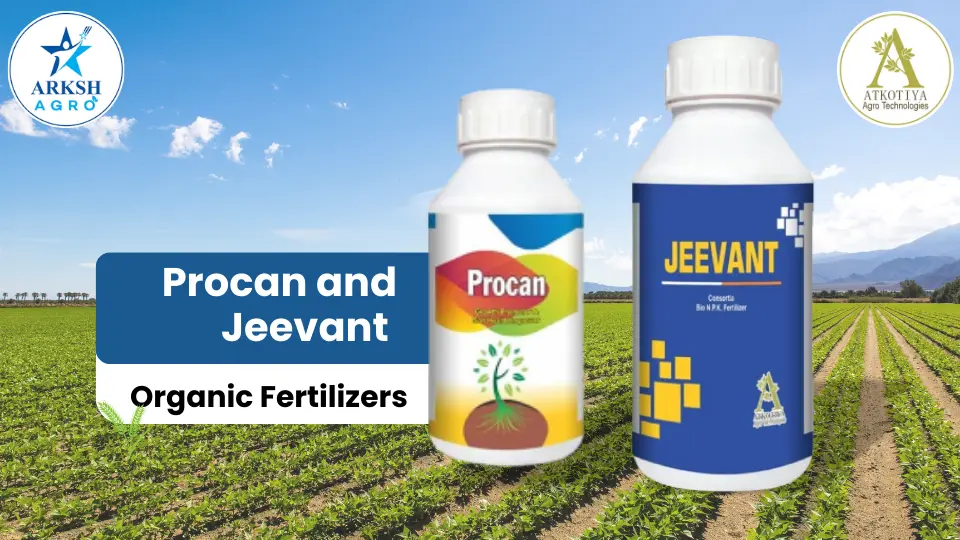
In recent years, organic farming in Nepal has gained significant speed because farmers and consumers equally recognize the value of sustainable agriculture.
Nepalese farmers are turning to environmentally friendly solutions to ensure safe food protection and environmental protection, with increasing awareness about the harmful effects of chemical fertilizers and pesticides.
With initiatives like the 10th Five-Year Plan encouraging its adoption for sustainable development, the Nepalese government has also made organic agriculture a priority.
During this shift, Arksh Agro has emerged as a trusted leader, offering affordable and innovative organic fertilizers in Nepal that empower farmers to grow healthier crops while preserving the land.
Importance of Organic Farming in Nepal
Organic farming is the foundation of sustainable agriculture in Nepal, where agriculture is still an important part of the economy and makes a major contribution to the country's GDP.
Organic farming keeps the soil healthy, increases biodiversity, and makes sure that food is safe by not using synthetic chemicals.
These methods fit with many different agricultural areas of Nepal, where traditional farming has used natural inputs such as manure for a long time.
Long-term benefits of organic farming in Nepal include:
- Soil Health Preservation: Organic fertilizers enrich soil with natural nutrients, improving fertility and structure over time.
- Reduced Chemical Dependency: Reducing the use of lower synthetic inputs helps lower environmental pollution and health risks.
- Food Safety: Organic produce is free from harmful residues, meeting growing consumer demand for safe, nutritious food.
For Nepali farmers, these practices not only protect the environment but also increase economic stability by reducing input costs and accessing premium markets for organic products.

Problems in Traditional Farming Today
Traditional farming, which depends heavily on chemical fertilizers and pesticides, has significant challenges in Nepal. Excessive use of agrochemicals has caused:
- Soil Degradation: Excessive chemical use reduces soil organic matter and reduces fertility and crop yields over time.
- Overusing Pesticides: Applying them more makes pests resistant, pollutes the environment, and causes health problems like immune system problems and reproductive problems.
- Lower Yields: Continuous chemical use disrupts soil ecosystems, leading to lower productivity and higher costs.
In contrast, organic fertilizers in Nepal, such as those offered by Arksh Agro, are safer, more sustainable options that improve the health of the soil and reduce the need for harmful chemicals.
Benefits of Organic Farming

There are various benefits for Nepali farmers, both small and large, when they switch to organic farming. They are:
- Better Soil Fertility: Compost, biofertilizers, and other organic inputs enhance soil structure and nutrient content, supporting long-term productivity.
- Increased Crop Resilience: Organically grown plants are healthier and more resilient to climatic fluctuations, pests, and diseases.
- Safer Produce: Organic crops are free from chemical residues, attractive to health-conscious consumers, and commanding premium prices.
- Cost-Effectiveness: Farmers can lower input costs by using locally accessible resources, such as biofertilizers and farmyard manure.
- Sustainability: Organic farming supports biodiversity, conserves water, controls climate change, and provides a healthy environment.
These benefits make organic farming a feasible method for sustainable agriculture, aligning with Nepal’s goals for food security and environmental preservation.
Modern Organic Farming Solutions with Arksh Agro
Arksh Agro is at the forefront of revolutionizing Organic Farming in Nepal with its innovative variety of Atkotiya Agro Products.
Committed to affordability, safety, and stability, Arksh Agro provides farmers with high-quality organic fertilizers and insect management solutions to suit the diverse agricultural conditions of Nepal.
By combining traditional knowledge with modern science, the company empowers farmers to achieve higher yields while protecting the environment.
Their Atkotiya fertilizers in Nepal are designed to meet the needs of both small farmers and large-scale producers looking for better growth.

Organic Fertilizers by Arksh Agro: Detailed Product Breakdown
Arksh Agro offers a comprehensive lineup of organic fertilizers in Nepal, each formulated to address specific agricultural needs.
A detailed overview of their key products, their applications, and their benefits over chemical options is as follows:
- Mitaphi: A biofertilizer enriched with beneficial microbes, Mitaphi increases nutrient uptake and promotes root development.
Apply 5-10 kg per hectare during soil preparation. By enhancing soil microbial activity, it outperforms chemical fertilizers and produces healthier crops.
- Whiteout Super: A natural insect repellent that manages whiteflies and other sucking insects. Mix 2-3 ml per liter of water for leaf spray. Unlike chemical pesticides, it does not leave any harmful residues, thus making production safe.
- Whiteout Herbal: An herbal pesticide that kills soft-bodied pests without affecting beneficial organisms. Apply 2 ml per liter every 7-10 days.
Whiteout Herbal was applied by Jumla farmers, and the pest infestation was reduced by 20%.
- Baiclean: A broad-spectrum biofungicide that stops powdery mildew and other fungal diseases. Use 2-3 g per liter for leaf spray.
It offers a safer option compared to chemical fungicides, protecting crops without environmental harm.
- Prerana: A growth promoter, boosts photosynthesis and crop vigor. Apply 1-2 ml per liter during vegetative growth.
Farmers in Chitwan noted a 15% yield increase in vegetables using Prerana compared to chemical boosters.
- Green Shield: A non-toxic insecticide repellent that protects crops from chewing pests. Spray weekly with 2 ml per liter.
It reduces pesticide dependency, as seen in rice fields in Kailali.
- Herb Shield: An insecticide that controls varied pests. Spray every 10 days with 2-3 ml per liter.
It's an ideal option for organic certification due to its non-toxic nature.
- Striker-W: A bio-insecticide against caterpillars and worms, Striker-W is applied at 2 g per liter. Lamjung farmers saw better maize crops with minimized pest activity.
- Crop Verdant: A nutrient-rich leaf spray, Crop Verdant increases plant growth and yield. Spray with 1-2 ml per liter of water when the crop is in flower. It is a cheaper choice than chemical fertilizers, improving fruit quality in orchards.
- Olishield I and Olishield II: These biofungicides control soil-borne and leaf diseases, respectively. Apply 2-3 g per liter as a soil-applied treatment or leaf spray. They have been found effective in the blight management of tomatoes in Lalitpur.
- Jeevant: A microbial biofertilizer, Jeevant boosts soil fertility and nutrient availability. Apply 5 kg per hectare during sowing. It replicates the success of Jeevatu, a well-known Nepalese biofertilizer, in improving yields across a variety of crops.
- Procan: A plant growth stimulant, Procan improves fruiting and quality. Spray 1 ml per liter during flowering. It's widely used in Dolakha fruit gardens for increased productivity.
- Prosper: An organically balanced fertilizer, Prosper keeps the plant healthy. Use 10 kg per hectare at planting. It's an eco-friendly alternative to urea to prevent soil acidification.
- Alga Aqua: A biostimulant derived from seaweed, Alga Aqua is applied to build crop resistance and yield. Apply 2 ml per liter of foliar spray. Rice growers in Rupandehi saw a 10% increase in rice yield with the application of Alga Aqua.
These Atkotiya fertilizers in Nepal are designed for ease of use, low cost, and suitability for Nepal's varied agroecological regions for maximum effectiveness with no compromise on sustainability.
Modern Farming Solutions for Nepali Farmers
Arksh Agro’s modern agriculture products in Nepal are designed to maximize productivity with ecological balance.
Regarding the use of products of biofertilizers, biostimulants, and natural plant pesticides, it helps farmers to easily switch from traditional to organic farming.
The products reduce input costs, increase crop quality, and address the increasing demand for organic yield in both local and export markets.
Practical Tips for Transitioning to Organic Farming:
- Start Small: Start with a small area to test with organic fertilizers such as Prosper or Jeevant, slowly scaling up.
- Soil Testing: Utilize services such as the ones provided by Arksh Agro to determine soil health and choose suitable products.
- Crop Rotation and Composting: Implement crop rotation and composting to raise soil fertility naturally.
- Use Biofertilizers: Incorporate products like Mitaphi and Alga Aqua to boost nutrient availability without synthetic inputs.
- Training and Support: Utilize Arksh Agro's technical support and training sessions to gain knowledge of organic farming methods.
Through the adoption of these strategies, farmers in Nepal can decrease chemical dependence, increase yields, and help achieve sustainable agriculture.
Conclusion
Organic farming in Nepal is not just a trend but a necessity for food security, environmental sustainability, and economic stability.
Arksh Agro is a leader in making low-cost, safe, and innovative Atkotiya Agro Products available that facilitate farmers in adopting sustainable farming.
From biofertilizers like Jeevant and Prosper to natural pest control solutions like Whiteout Super and Green Shield, their offerings are transforming Nepali agriculture.
With Atkotiya fertilizers in Nepal, farmers can obtain better yields, better crop health, and a sustainable tomorrow.
Call to Action: Check out Arksh Agro’s website to learn about all our organic solutions and start your path to sustainable farming!





.png)
.png)





.webp)


.png)

.png)